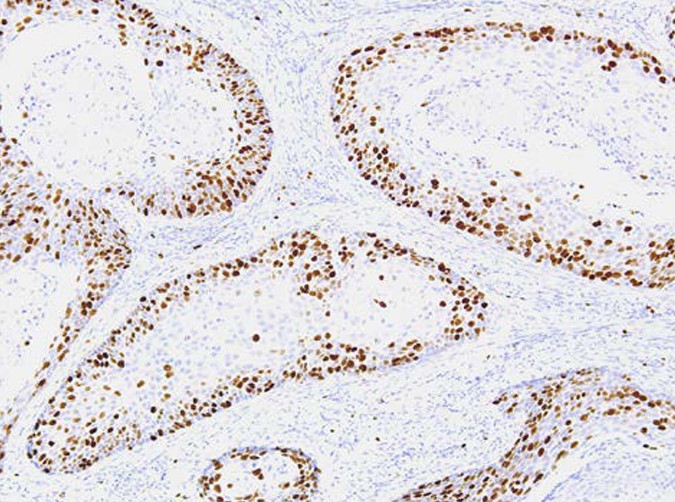Anti-Ki-67 Antibody (34063)
$284.00
Overview
Product Name Anti-Ki-67 Antibody (34063)
Description Anti-Ki-67 Mouse Monoclonal Antibody
Target Ki-67
Species Reactivity Human
Applications IHC
Host Mouse
Clonality Monoclonal
Clone ID G067.1
Isotype IgG1
Immunogen Recombinant human Ki-67.
Properties
Form Liquid
Concentration Lot Specific
Formulation Tris buffer, pH 7.3-7.7, 1% BSA, 0.1% sodium azide.
Buffer Formulation Tris
Buffer pH pH 7.3-7.7
Buffer Anti-Microbial 0.1% Sodium Azide
Buffer Protein Stabilizer 1% Bovine Serum Albumin
Format Purified
Purification Purified by immunoaffinity chromatography
Specificity Information
Specificity Human Ki-67. Reactivity with other species has not been investigated.
Target Name Proliferation marker protein Ki-67
Target ID Ki-67
Uniprot ID P46013
Alternative Names Antigen identified by monoclonal antibody Ki-67, Antigen KI-67, Antigen Ki67
Gene Name MKI67
Sequence Location Chromosome, Nucleus, Nucleus, nucleolus
Biological Function Required to maintain individual mitotic chromosomes dispersed in the cytoplasm following nuclear envelope disassembly (PubMed:27362226). Associates with the surface of the mitotic chromosome, the perichromosomal layer, and covers a substantial fraction of the chromosome surface (PubMed:27362226). Prevents chromosomes from collapsing into a single chromatin mass by forming a steric and electrostatic charge barrier: the protein has a high net electrical charge and acts as a surfactant, dispersing chromosomes and enabling independent chromosome motility (PubMed:27362226). Binds DNA, with a preference for supercoiled DNA and AT-rich DNA (PubMed:10878551). Does not contribute to the internal structure of mitotic chromosomes (By similarity). May play a role in chromatin organization (PubMed:24867636). It is however unclear whether it plays a direct role in chromatin organization or whether it is an indirect consequence of its function in maintaining mitotic chromosomes dispersed (Probable). {UniProtKB:E9PVX6, PubMed:10878551, PubMed:24867636, PubMed:27362226}.
Research Areas Cancer research
Background Ki-67 is a nuclear, non-histone protein that is expressed only during active phases of the cell cycle (G1, S, G2, and M), but not in the resting phases of G0 and G1 early phase. Although it has been associated with ribosomal RNA transcription, it is strongly linked to cell proliferation and has been used as an effective marker in grading proliferation rate of tumors including those of brain, breast, cervix, and prostate.
Application Images


Description Immunohistochemistry: use at a dilution of 1:100-1:200 on formalin-fixed, paraffin-embedded samples after heat-induced epitope retrieval at pH 9 for 10-30 minutes. Detection of Ki-67 in human cervical cancer tissue with #34063 diluted 1:100-1:200.
Handling
Storage Store at 2-8°C. Do not freeze.
Dilution Instructions Dilute in PBS or medium that is identical to that used in the assay system.
Application Instructions
Immunohistochemistry: use at a dilution of 1:100-1:200 on formalin-fixed, paraffin-embedded samples after heat-induced epitope retrieval at pH 9 for 10-30 minutes.
Immunohistochemistry: use at a dilution of 1:100-1:200 on formalin-fixed, paraffin-embedded samples after heat-induced epitope retrieval at pH 9 for 10-30 minutes.
References & Data Sheet
Data Sheet  Download PDF Data Sheet
Download PDF Data Sheet
 Download PDF Data Sheet
Download PDF Data Sheet


